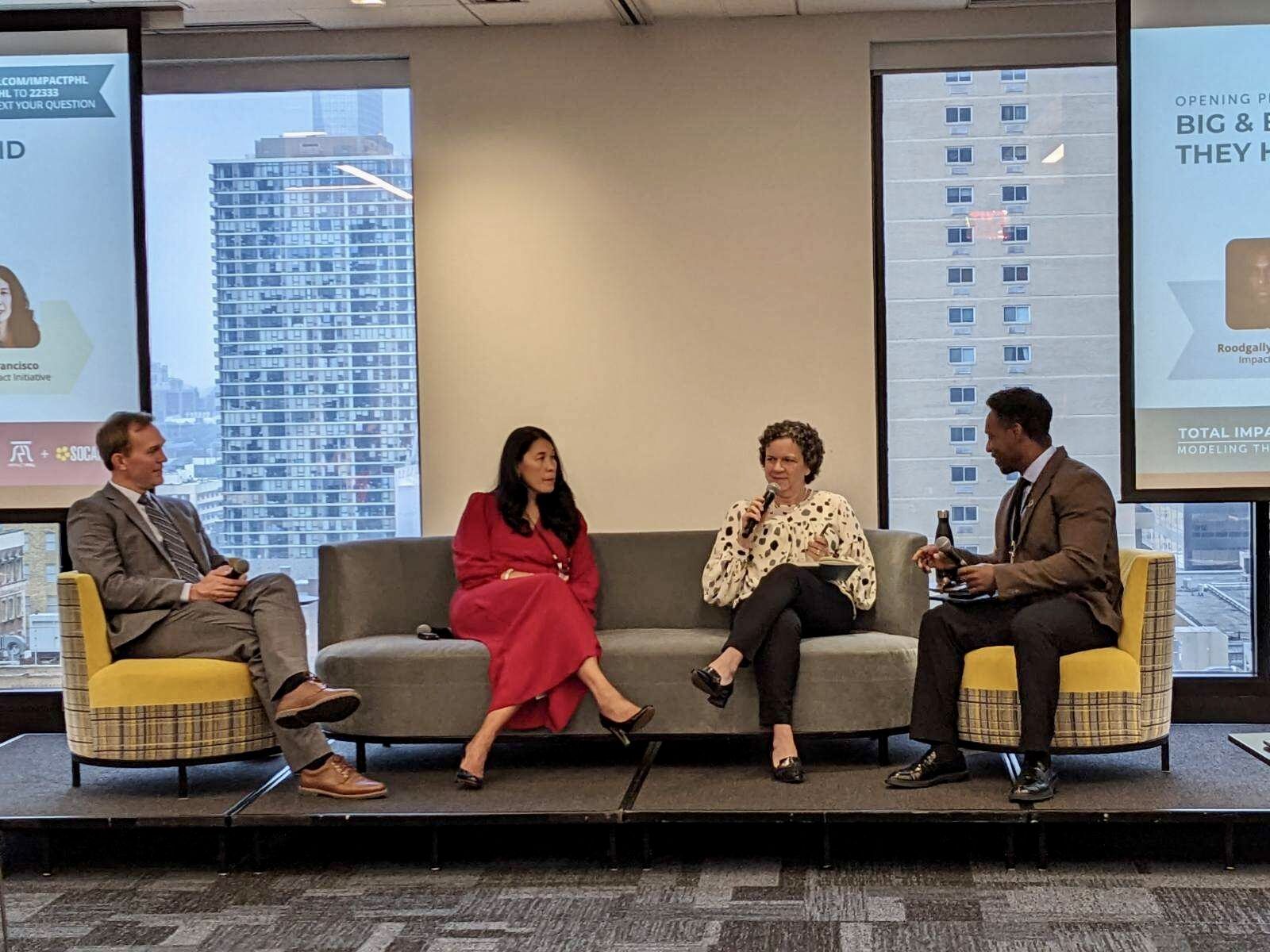Greetings, Agents of Impact!
Featured: ImpactAlpha Original
TPG Growth’s Rise Fund rocked by federal charges against CEO Bill McGlashan. In the morning, the private-equity power player’s name was among the 50 people charged in Operation Varsity Blues, the federal crackdown on a wide-ranging college admissions scam. By afternoon, McGlashan had been placed on leave – and the future of impact investing’s most prominent fund manager was in doubt. McGlashan, who built TPG Growth into a $13 billion juggernaut before raising a $2 billion impact fund, was in the midst of raising $3.5 billion for Rise II, one of the world’s largest impact funds. “As a result of the charges of personal misconduct against Bill McGlashan, we have placed Mr. McGlashan on indefinite administrative leave effective immediately,” said a TPG spokesperson. Jim Coulter, the co-CEO of TPG, is taking over as interim managing partner of both TPG Growth and The Rise Fund, the spokesperson said, and will “lead all investment work for both going forward.”
The impact on impact investing could be significant. McGlashan, who co-founded the Rise Fund with U2 frontman Bono and billionaire Jeff Skoll, had attracted a Who’s Who of investors, including Richard Branson, Reid Hoffman, Laurene Powell Jobs and Pierre Omidyar, along with pension funds and other institutional investors. He had become an outspoken advocate of a brash approach that aimed for high returns and high impact, which Rise seeks to measure with a methodology it calls “the impact multiple of money.” Significantly, Rise had been close to a deal to take over a Gates Foundation-backed $1 billion global health fund from the Abraaj Group, which was brought down last year by a scandal of its own. The Varsity Blues indictment presents an awkward juxtaposition to McGlashan’s rhetoric of social equity and justice. McGlashan is accused of making a $50,000 contribution in exchange for falsifying his son’s college-entrance test results, and promising another $200,000 once he was admitted to the University of Southern California. Share this post.
- ImpactAlpha’s 2018 Q&A with Bill McGlashan.
Series: What’s Next
Driving “impact-career alpha.” As the race to attract and retain skilled impact professionals heats up, the industry’s talent pipeline is in need of a makeover. “The institutions tasked with developing and recruiting finance professionals face entrenched, traditional, and in some cases, outdated practices,” wrote the GIIN’s Amit Bouri in his call on ImpactAlpha for ideas for mobilizing talent for impact investing. “If we don’t revise these practices, we will never be able to institutionalize impact as a standard part of the investment process.”
- Hard skills. Impact investing is “still investing and requires understanding of financial modeling, company and industry analysis, as well as basic understanding of how companies get capitalized,” says Blue Haven Initiative’s Lauren Cochran.
- Soft skills. Programs that teach hard-nosed business skills need a dose of purpose, says McCombs School of Business’ Meeta Kothare. “A diverse student body, an environment where all voices are included and respected, experiential and interdisciplinary learning, even some community service components, will help students carry out this work with deeper compassion and empathy.”
- Impact-first. Traditional investors may be good at structuring deals, says SVX Mexico’s Stevie Smyth Valdez, but the impact learning curve is steep. “Let’s get people who have been committed to impact from the very outset of their careers, or have a ton of experience working on the ground.”
- Career upside. “Are there fundamental long-term upsides in choosing a career in impact?” asks Bain Capital’s Christopher Cozzone. Let’s attract the right talent, he says, by promoting “impact-career alpha.”
- Impact investing is investing. “Amit is right,” says Equilibrium Capital’s Dave Chen. “As much as we talk about more money coming into the sector, we need to talk about upgrading the fund managers.”
- Keep reading “Driving impact-career alpha” on ImpactAlpha.
Dealflow: Follow the Money
OPIC invests $10 million in off-grid solar in Chad. Chad is one of the poorest—and most energy-poor—countries in the world. Only 4% of the landlocked central African country’s 15 million people have access to electricity. Chad’s installed energy capacity is so low it doesn’t register in statistical databases. OPIC’s first investment in the country is a $10 million loan to support the Alternaprod Tchad project, which will distribute and install solar kits and appliances for households, small businesses and community institutions. It is OPIC’s 33rd project supporting Power Africa, the U.S.-led energy access initiative. Here’s more.
Aibono secures $2.5 million to connect India’s small farmers to food retailers. The Bangalore-based startup is working to prevent food waste, improve agricultural efficiency and support farmer incomes with farm services and software to connecting India’s small farmers to retailers. Aibono outfits farms with sensors and analytics software to improve harvest predictability. It then analyzes farmers’ data alongside food consumption data, and works between farmers and retailers to ensure the supply of food being produced matches demand. The company works with 400 farmers and 250 retailers in the Bangalore area. Its Series A funding from impact fund Menterra, Milliways Venture, Artha Ventures, Rebright Partners and 3one4 will support growth to 1,000 farms and 2,000 retailers. Learn more.
Signals: Ahead of the Curve
Wells Fargo tells Congress it is exiting private-prison lending. CEO Tim Sloan gave an update on the firm’s promise to break from lending to private prison operators CoreCivic and GEO Group. “We made a decision two years ago to exit two relationships we had with two private prison firms,” Sloan testified at a congressional hearing. “One has been exited and when the credit agreement with the other matures, we will no longer have a relationship.” Last week JP Morgan, under pressure from activists and activist investors, said it would no longer bank the operators of private prisons and for-profit immigration detention centers in the U.S.
- Accountability. Sloan failed to recall which firm the bank had halted lending to. Rep. Alexandria Ocasio-Cortez (D-N.Y.) pressed him about “human rights abuses and environmental disasters” some say are financed by the bank. Tweeted Candide Group’s activist and investor Morgan Simon, “We look forward to holding them accountable.”
Agents of Impact: Follow the Talent
Jan Stahlberg, co-founder of Scandinavian private-equity giant EQT, has left to start an impact investment fund with a nine-digit commitment from Nordea bank… Dale Royal joins the Local Initiatives Support Corp. as executive director in Atlanta… Market-research firm Refinitiv (formerly Thomson Reuters Financial & Risk) appoints Leon Saunders Calvert to head its newly created sustainable investing and fund ratings division… Impact-knowledge hub Philanthropy University is hiring an instructional designer… UBS Wealth Management opens applications for its six-month sustainable investing internship… Fossil Foundation, Pearson and Accenture partner with Unreasonable’s accelerator on the future of work.
— March 13, 2019.











